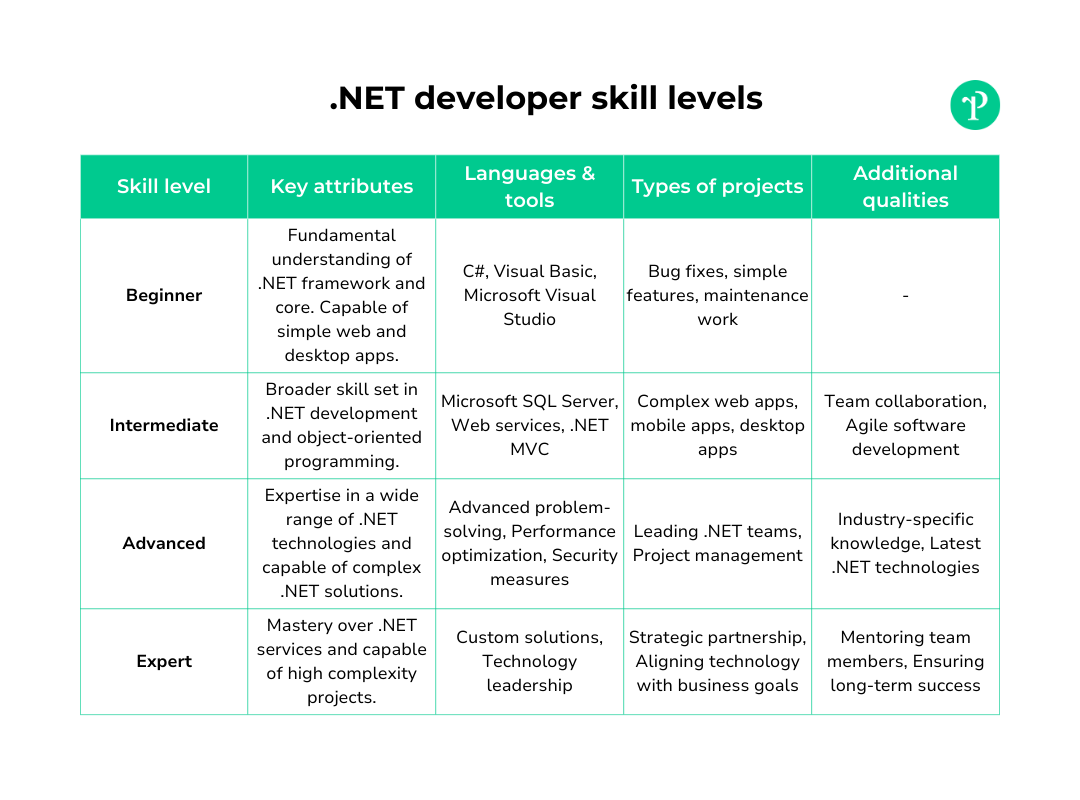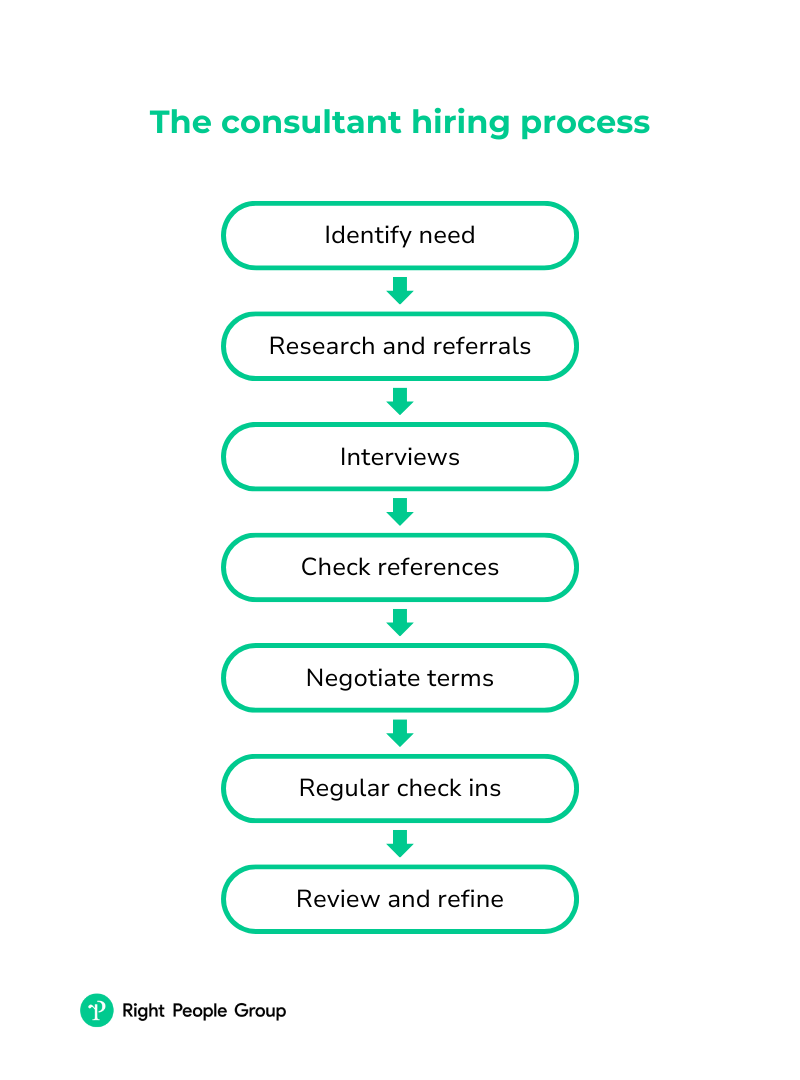In 2023, the evolving tech scene urges many businesses to seek .NET developer expertise for creating robust applications.
The choice often lies between hiring full-time developers or consulting experts. .NET consultants, with their diverse experience and flexible engagement, are becoming a go-to choice. They offer specialized skills for specific projects without a long-term commitment, unlike full-timers.
This blog shares insightful tips on hiring a .NET development consultant, ensuring your project starts strong with adept .NET solutions.
We will cover:
Understanding .NET development basics
Identifying the right skill set
Skill levels
Industry-specific expertise in .NET development projects
Soft skills
How to budget for a .NET consultant
The hiring process
Example interview questions
Working with .NET development consultants post-hire
Understanding .NET development basics
The .NET framework is a key player in making many types of software solutions like web, desktop, and mobile apps. It’s sturdy and easy to tweak, helping to create efficient and scalable .NET applications.
Knowing the basics of the .NET framework helps in writing accurate job descriptions. This is important when you’re planning to hire dot NET developers as it helps in finding those with the skills needed for your projects.
A clear understanding of .NET basics also ensures that you can better match your project requirements. This way, the .NET consultant or team is well-prepared to provide the solutions you’re looking for.
Here’s a simplified look at some fundamental aspects of .NET development:
Core components:
.NET Core: A crucial part of the .NET family, known for working across different systems – Windows, macOS, and Linux, letting developers build applications that run smoothly on all.
.NET Framework: The original platform for making Windows applications. It’s wide-ranging and well-established, with a big library of ready-to-use solutions and controls.
ASP.NET MVC: A framework for creating web apps, and keeping things neat and organized, which helps in maintaining a clean codebase.
Languages:
C# and Visual Basic: The main languages used in .NET development. C# is liked for its simplicity and strong features, while Visual Basic is user-friendly, especially for new developers.
Development environments:
Microsoft Visual Studio: A highly integrated space used by .NET developers for building, checking, and publishing applications across different .NET platforms.
Database management:
Microsoft SQL Server: A system that works well with .NET applications, ensuring data is stored, accessed, and managed efficiently.
Latest updates:
.NET 6 and the upcoming .NET 7: Staying updated is important as new versions bring fresh features, better performance, and stronger security. This knowledge is key not just to understand the abilities of potential .NET developers but also to match your project requirements with the latest .NET technologies.
Development practices:
Agile software development: Adopting agile methods in .NET development promotes teamwork, ongoing improvement, and readiness to adapt to change.
Identifying the right skill set
Identifying the right skill set is crucial when looking to hire a .NET consultant.

The specifics of your project will dictate the skills and experience level needed from your consultant.
Here are some examples:
Web application development
If your project is about developing web applications, look for consultants with a strong background in ASP.NET, .NET MVC, and JavaScript. Experience with frameworks like Angular or React will be a plus.
Mobile app development
For a mobile app project, a consultant with expertise in Xamarin or .NET MAUI, and a good grasp of mobile UI/UX principles would be ideal.
Desktop application development
If you are aiming to create a desktop application, skills in WPF or WinForms are essential. Familiarity with modern UI principles can also be beneficial.
Database management
Should your project require strong database management, seek consultants with proficiency in Entity Framework, SQL Server, or other relevant database technologies.
Cloud integration
For projects involving cloud integration, look for .NET consultants with experience in Azure or AWS, and knowledge of cloud-native solutions.
E-commerce platform
When developing an e-commerce platform, a consultant with experience in ASP.NET Core, along with knowledge of payment gateway integrations and security protocols is crucial.
Maintenance and optimization
If your need revolves around optimizing existing .NET applications or maintenance, a consultant with a knack for performance tuning and troubleshooting would be handy.
Custom software solutions
For bespoke software solutions, find a consultant with a rich history of delivering custom .NET projects, showcasing creativity and problem-solving abilities.
Skill levels
When you’re looking to hire .NET developers, knowing the skill levels and matching them with what your project needs will help you find the right people.
Here’s a breakdown of skill levels from beginner to advanced, and what each brings to the table:
Beginner:
Fundamental understanding: At this level, .NET developers have a basic understanding of the .NET framework and .NET core. They are acquainted with creating simple web applications and desktop apps.
Languages: They have foundational knowledge of languages like C# and Visual Basic.
Tools: Familiarity with Microsoft Visual Studio for developing, debugging, and testing their code.
Simple projects: Ideal for projects with well-defined tasks such as bug fixes, adding simple features, or maintenance work.
Intermediate:
Broader skill set: Intermediate .NET developers have honed their skills in net development, capable of building more complex web apps, mobile apps, and desktop apps. They have a good grasp of object-oriented programming.
Database management: They can work comfortably with Microsoft SQL Server, managing data effectively.
Web Services: Have experience in creating and consuming web services, and may have dabbled in net mvc to build dynamic, data-driven web applications.
Team collaboration: They can work well in a development team, and are starting to get a grip on the agile software development process.
Advanced:
Expertise: Advanced .NET developers are well-versed in a wide range of .NET technologies, capable of architecting and developing complex .NET solutions.
Problem-solving: They excel in solving complex problems, optimizing performance, and ensuring security in .NET applications.
Leadership: Likely to have experience leading .NET development teams, managing projects from inception to delivery.
Industry experience: They often bring industry-specific knowledge, making them invaluable for complex projects with specialized requirements.
Latest technologies: Staying updated with the latest in .NET core development, .NET migration, and other evolving .NET technologies.
Expert:
Mastery: Expert .NET developers possess a deep understanding and mastery over .NET development services, capable of tackling high complexity projects, and delivering innovative software solutions.
Custom solutions: They are adept at crafting custom solutions, whether it’s developing embedded systems or specialized .NET solutions that cater to unique business needs.
Technology leadership: They can guide technology decisions, ensure best practices, and mentor other members of the net development team.
Strategic partnership: Engaging with expert .NET developers can foster a strategic partnership, aligning technology with business goals, and ensuring long-term success.

Whether you need seasoned .NET developers for a big project or a beginner for smaller tasks, picking the right skill level is key to your project doing well.
Industry-specific expertise in .NET development projects
When aiming to hire .NET developer expertise, considering their knowledge in your industry is crucial. Different sectors like healthcare, finance, and retail have unique challenges and regulations. Here’s why industry-specific expertise is valuable:
Understanding business needs: .NET developers with industry experience grasp your business needs quickly, translating requirements into effective .NET solutions smoothly.
Regulatory compliance: In regulated industries like healthcare and finance, experienced .NET developers ensure your software solutions comply with necessary standards from the start.
Efficient communication: Common industry language eases communication, making discussions about project details smoother.
Ready-to-use solutions: Experienced .NET developers can leverage pre-existing solutions or frameworks, speeding up the development process and reducing project costs.
Predicting potential challenges: Industry experience helps .NET developers anticipate common challenges and plan for them in advance.
Tailored .NET development services: A .NET developer or a .NET development company with industry expertise can provide services that align well with your business model.
Relevant technology stack: Choosing the right .NET technologies stack is vital. Developers with industry expertise are better placed to select the most suitable technologies like Microsoft SQL Server for database management or ASP.NET MVC for web applications.
Considering industry-specific expertise when you hire dot net developers can significantly impact the success of your net project, ensuring your net applications align with the unique demands and regulations of your industry.
Soft skills
Soft skills complement technical abilities, especially in .NET programmer roles. Here’s a bit more insight on the mentioned soft skills:
Problem-solving ability
Every project has its bumps. A .NET consultant who’s good at problem-solving can spot issues and come up with solutions quickly, keeping things moving along nicely.
Effective communication
Clear communication is essential for the success of a project. A consultant who can articulate ideas and issues well ensures that everyone is on the same page, reducing the likelihood of misunderstandings.
Teamwork and collaboration
Getting along with others and working well together just makes everything easier. A consultant who’s good at teamwork can share ideas, take on feedback, and help create a positive and productive work vibe, making the project a smoother ride for everyone involved.
Combining these soft skills with solid technical know-how can set a .NET consultant apart, ensuring your project stays on track and is a pleasant journey for everyone involved.
How to budget for a .NET consultant
The skills you need in a .NET consultant really depend on what your project looks like. Budget is another factor that plays into this decision. Here’s a simpler explanation:
Complex projects
If your project has many moving parts, like building a detailed web app or handling loads of data, you’ll want a consultant who’s got a lot of experience and deep knowledge.
They should be able to handle surprises and solve tough problems easily.
However, their expertise may come at a higher cost, which is something to consider in your budget.
Estimated budget: €80 – €150 per hour
Medium-level projects
For something in the middle, like creating a mobile app with several features or moving your current system to the cloud, a consultant with good .NET skills and some experience in similar projects should do the trick.
They should be good at solving problems and adjusting to new requirements.
Their fees might be more moderate and better suited for a mid-range budget.
Estimated budget: €50 – €80 per hour
Simple projects
If your project is more straightforward, like fixing bugs or adding a few new features to an existing app, a consultant with basic .NET skills might be enough.
They should understand the basics well and be able to work on their own without much help.
This option could be more budget-friendly, providing a solution without stretching your finances.
Estimated budget: €30 – €50 per hour
Please note that these are just estimates and actual costs can vary. It’s always a good idea to get multiple quotes and consider the specific needs of your project.
The hiring process
Hiring dedicated dot NET development consultants entails a structured approach, ensuring that each stage of the process is meticulously crafted to attract and evaluate the right talent.

The consultant hiring process
Here’s a breakdown of the steps and strategies to consider:
1. Identify the need
Know the nature of your project: Is it a web, mobile or desktop application?
List down the specific .NET skills and levels of experience your project demands.
Determine the duration for which you’ll need the consultant.
2. Research and referrals
Ask for recommendations from industry contacts who have hired .NET consultants before.
Look up online platforms dedicated to freelance or consulting .NET developers.
Review portfolios and read client testimonials to get an idea of their expertise and work ethic.
3. Interviews
Prepare a list of technical questions to assess their .NET skills.
Discuss past projects to understand their practical experience.
Assess their communication skills and ensure they align with your team’s working style.
4. Check references
Contact their previous clients to get feedback on their work quality, reliability, and adherence to deadlines.
Ask about their problem-solving abilities and how they handled challenges.
5. Negotiate terms
Clearly define the scope of work, deliverables, deadlines, and payment terms.
Discuss the procedure for any possible changes in scope or additional work.
Ensure everything is put down in a written contract to avoid any future misunderstandings.
6. Regular check-ins
Set up regular update meetings to track progress.
Make sure there’s a clear channel for feedback and necessary adjustments.
Utilize project management tools to keep everything organized and on track.
7. Review and refine:
Once the project is completed, evaluate the consultant’s work against the set goals.
Collect feedback from your team on the engagement.
Discuss what went well and what didn’t, and how you can improve the process for future engagements.
Following this detailed approach will not only help in hiring the right .NET consultant but also ensure smooth execution and successful completion of your project.
Example interview questions
When interviewing .NET programmers, tailoring your questions to the complexity of the project can yield better insights into their capabilities. Here are some sample questions categorized based on project complexity:
Complex projects
Can you describe your experience with microservices architecture and how you have implemented it in a .NET environment?
How have you handled data security concerns in your past projects, especially when working on cloud platforms?
Can you explain a time when you had to optimize a .NET application for high performance and scalability? What steps did you take?
Describe your experience with continuous integration/continuous deployment (CI/CD) in .NET projects. What tools or practices do you prefer?
Have you had to troubleshoot a challenging bug or issue in a .NET application? How did you approach the problem?
Medium projects
How would you design a RESTful API using .NET? What considerations would you take for versioning?
Can you discuss your experience with ORM frameworks like Entity Framework? How do you handle complex queries or optimize performance?
What approaches have you used to ensure a .NET application’s security and data integrity?
How have you managed state in a .NET web application?
Can you describe a time when you had to work with a front-end team to integrate with a .NET backend? How did you ensure smooth collaboration?
Simple projects
How would you set up a new .NET project? What tools or frameworks would you use?
Can you describe your experience with .NET Core and .NET Framework? Do you have a preference?
How would you handle error logging and exception handling in a .NET application?
What are your go-to strategies for testing .NET applications?
How do you stay current with the evolving .NET ecosystem, and how do you apply new learnings to your projects?
Each set of questions aims to uncover the candidate’s technical depth, problem-solving abilities, and their capacity to collaborate and communicate effectively within your project’s context.
Working with .NET development consultants post-hire
After you hire .NET developer consultants, the real work begins. The collaborative phase kicks off, and it’s essential to ensure smooth communication and effective project management to meet your business needs. Here’s a guide to making the most out of this partnership.
Project kickoff
Initiate the project with a kickoff meeting to align the net development team with your project goals, timelines, and deliverables. It sets the right tone and ensures everyone is on the same page from the get-go.
Clear communication
Establish clear channels of communication. Regular updates and feedback loops are essential to keep the project on track. Using tools like Microsoft Visual Studio for tracking progress and managing tasks can be beneficial.
Agile software development process
Adopt an agile software development process to promote a collaborative environment, iterative progress, and flexibility to adapt to changes.
Technical alignment
Ensure that the .NET developers are well-versed with the .NET technologies stack chosen for the project. Whether it’s .NET core for cross-platform solutions, ASP.NET MVC for web applications, or Microsoft SQL Server for database management, the right technology alignment is crucial.
Code reviews
Conduct code reviews to ensure the software solutions meet the project’s coding standards and quality expectations. It’s a good practice to catch potential issues early on.
Testing and Quality Assurance (QA)
Implement a robust testing and QA process to ensure the .NET solutions are bug-free and meet the desired performance standards.
Documentation
Insist on thorough documentation for the .NET applications developed. Good documentation eases future maintenance and net migration processes.
Training and knowledge transfer
If necessary, arrange for training sessions where the .NET developers can transfer knowledge to your in-house development team, ensuring a smooth transition and long-term project success.
Performance tracking
Track the performance of the solutions against the defined metrics and goals. It helps in identifying areas of improvement.
Continuous improvement
Post-project, analyze the performance, and identify lessons learned. It’s an opportunity to refine the working process with the .NET development team for future projects.
Need help with .NET?
At Right People Group, we can link you up with freelance .NET Core and .NET Framework consultants. Working with a consultant means you get personalized advice, avoid common mistakes, and keep your software project on track.
Interested? Feel free to get in touch. We’ll help find the right consultant for your project needs.
Conclusion
The journey to hire expert dot Net developers requires a well-thought-out strategy. Adapting to the evolving tech landscape, understanding the core competencies required, and fostering a conducive work environment are key steps towards building a robust .NET development team. As you venture into hiring, bearing in mind these practical tips can significantly streamline the process, ensuring you secure the right talent to drive your .NET solutions forward into 2023 and beyond.













